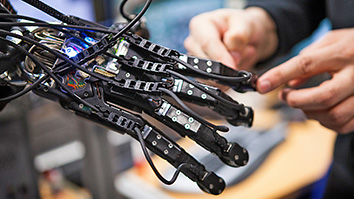Citation
Newmyer, S., Ssemadaali, M. A., Radhakrishnan, H., Javitz, H. S., & Bhatnagar, P. (2022). Electrically regulated cell-based intervention for viral infections. Bioengineering & Translational Medicine, e10434.
Abstract
This work reports on an engineered cell that—when electrically stimulated—synthesizes a desired protein, that is, ES-Biofactory. The platform has been used to express interferon (IFN)-β as a universal antiviral protein. Compelling evidence indicates the inevitability of new pandemics and drives the need for a pan-viral intervention that may be quickly deployed while more specific vaccines are in development. Toward this goal, a fast-growing mammalian cell (Chassis) has been engineered with multiple synthetic elements. These include—(1) a voltage-gated Ca2+ channel (Voltage-Sensor) that, upon sensing the electric field, activates the (2) Ca2+-mediated signaling pathway (Actuator) to upregulate (3) IFN-β, via an engineered antiviral transgene (Effector), that is, ES-Biofactory➔IFN-β. The antiviral effects of the ES-Biofactory➔IFN-β have been validated on severe acute respiratory syndrome coronavirus 2 (SARS-CoV-2)-infected cells. The irradiated ES-Biofactory, that does not exhibit oncogenic capacity, continues to exert antiviral effect. The resulting ES-Biofactory➔IFN-β uses a novel signaling pathway that, unlike the natural IFN synthesis pathway, is not subject to viral interference. Once clinically validated, the ES-Biofactory will be a universal antiviral cell therapy that can be immediately deployed in the event of an outbreak. The platform may also be useful in treating other diseases including cancer and autoimmune disorders.


